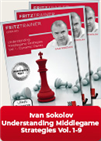Clearly superior in rapid and blitz
The three first days of the match between Hans Niemann and Nikita Vitiugov saw Niemann getting a 3-point lead by scoring the one win recorded in the classical section (consisting of 6 games). The disadvantage on the scoreboard was surely surmountable for Vitiugov, as 24 points were still up for grabs in the rapid and blitz sections. However, things went from bad to worse for the English GM, as Niemann was even more superior in the final two days of action.
In Saturday's rapid session, the intrepid US star scored 3 wins, with 2 games ending drawn and 1 victory for Vitiugov. Those results left Niemann with a 7-point lead going into the blitz segment - i.e. only a 10-2 win on Sunday would grant Vitiugov overall victory.
 In this Video-Course we deal with different dynamic decisions involving pawns. The aim of this Course is to arm club/tournament players with fresh ideas which they can use in their own practice.
In this Video-Course we deal with different dynamic decisions involving pawns. The aim of this Course is to arm club/tournament players with fresh ideas which they can use in their own practice.The first game of Sunday finished drawn, which was followed by Niemann winning 3 out of the next 4 games. By that point, overall victory was secured for the 21-year-old. Perhaps discouraged by his slow start, Vitiugov failed to score a single win in the final 7 games of the match - instead, it was Niemann who continued to impress, as he grabbed 4 more wins to get a final 9-3 victory in the blitz segment of the match.
Two days from now, starting Tuesday, Niemann will play yet another match with the same format. His next rival will be 41-year-old Etienne Bacrot. The match will take place at the picturesque Blitz Society Bar in Paris.
Results
- Classical: Niemann 10½ - 7½ Vitiugov
- Rapid: Niemann 8 - 4 Vitiugov
- Blitz: Niemann 9 - 3 Vitiugov

The final day of action at the Gem Fitzrovia Hotel in London | Photo: Frans Peeters
Niemann 1 - 0 Vitiugov
Rapid game #2
All games
In this video course, experts including Dorian Rogozenco, Mihail Marin, Karsten Müller and Oliver Reeh, examine the games of Boris Spassky. Let them show you which openings Spassky chose to play, where his strength in middlegames were and much more.
Links
























